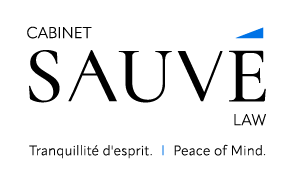Your Guide to Choosing an Executor in Ontario: Selecting a Steward for Your Peace of Mind
The Core of the Matter: The True Role of an Executor
At Sauvé Law, we believe that a well-crafted estate plan is the ultimate act of care for your loved ones. It’s a roadmap you create to protect your family, preserve your assets, and ensure your wishes are honored. Central to this plan is one of the most important decisions you will make: choosing your Executor, known in Ontario as an "Estate Trustee."
This person or institution will be responsible for carrying out your final wishes, a role that demands integrity, diligence, and a steady hand. The choice can feel overwhelming, but it doesn’t have to be a source of stress. Our goal is to demystify this process, providing you with the clarity and confidence needed to make a sound decision. This isn’t just about filling a legal role; it's about safeguarding your legacy and, most importantly, securing your Peace of Mind.
This guide, written in the plain language we pride ourselves on, will walk you through everything you need to consider when selecting your Estate Trustee in Ontario.
The Role of an Estate Trustee: More Than Just an Honour
Being named an Estate Trustee is often seen as a sign of great trust and respect. While it is certainly an honour, it is also a significant and time-consuming job with serious legal responsibilities. Your Estate Trustee is a fiduciary, meaning they have a legal duty to act with utmost good faith and exclusively in the best interests of your estate and its beneficiaries.
The duties can be extensive and may take anywhere from a year to several years to complete, depending on the complexity of your estate. Key responsibilities include:
- Locating and interpreting your Will: Understanding your instructions and intentions.
- Arranging the funeral: Following any wishes you’ve documented.
- Identifying and securing all estate assets: This includes everything from bank accounts and investments to real estate, vehicles, and personal belongings.
- Applying for the Certificate of Appointment of Estate Trustee with a Will (Probate): This is the court process that officially validates your Will and gives the Trustee the legal authority to act.
- Managing estate finances: Opening an estate bank account, paying bills, and managing investments.
- Notifying beneficiaries and creditors: Communicating with all involved parties.
- Filing tax returns: This includes a terminal T1 return for the year of death and potentially T3 trust returns for the estate itself.
- Paying all legitimate debts and taxes of the estate.
- Distributing the assets to the beneficiaries according to the terms of your Will.
- Keeping detailed and accurate records of every single transaction.
Given this extensive list, it's clear that the person you choose must be more than just someone you like; they must be someone you can unequivocally rely on.
The Essential Qualities of a Great Estate Trustee
When you start to list potential candidates, it's crucial to evaluate them against a checklist of essential qualities. Think beyond relationships and consider the practical skills and personal attributes required for the job.
- Unwavering Trustworthiness and Integrity: This is the absolute, non-negotiable foundation of your choice. Your Estate Trustee will have complete control over your assets and will be privy to sensitive personal and financial information. You must choose someone who you believe, without a shadow of a doubt, will act honestly, ethically, and transparently. They must be capable of putting your wishes and the interests of your beneficiaries above all else, especially their own.
- Strong Organizational Skills and Diligence: Administering an estate is a marathon of paperwork. Your Trustee will need to be organized, methodical, and detail-oriented. They will be tracking deadlines, managing correspondence with lawyers, accountants, and financial institutions, and maintaining meticulous financial records. A person who is naturally scattered or prone to procrastination will struggle with these demands, potentially causing costly delays and errors.
- Financial Acumen and Sound Judgment: Your Trustee doesn’t need to be a professional accountant, but they should have a comfortable understanding of basic financial concepts. They will be making important decisions about managing, selling, or distributing assets. They need the good judgment to know when to sell an investment, how to handle real estate, and, crucially, when to seek professional advice from lawyers, accountants, or financial advisors. The estate pays for this professional help, and a wise Trustee knows not to go it alone.
- The Gift of Time and Availability: This is a practical consideration that is often overlooked. Being an Estate Trustee is not a passive role; it is a significant time commitment. The initial months are particularly intensive, and the entire process can easily consume hundreds of hours. Consider your candidate's current life circumstances. Are they already overwhelmed with their own career, young family, or other commitments? You need to select someone who has the bandwidth and willingness to dedicate the necessary time to do the job properly without it becoming an unbearable burden.
- Impartiality and Emotional Stability: Grief can bring out complex emotions in families. Your Estate Trustee must be able to remain level-headed, impartial, and fair, especially if they are also a beneficiary. They need to navigate potential conflicts between beneficiaries with diplomacy and communicate clearly and patiently with everyone involved. Choosing someone who is known for their calm demeanor and ability to mediate, rather than escalate, conflict can be a saving grace for your family's harmony.
- Residence in Ontario: While not a strict legal prohibition, appointing someone who lives outside of Ontario (or Canada) can create significant complications. The court may require a non-resident Trustee to post a bond, which is an insurance policy to protect the estate, adding expense and delay. Furthermore, dealing with financial institutions and legal matters from a distance is logistically challenging. There can also be negative tax consequences for the estate if it is deemed to be non-resident for tax purposes. Whenever possible, choosing someone who resides in Ontario is the most practical and efficient option.
Who Should You Choose? Exploring Your Options
With these qualities in mind, you can start to consider the different types of candidates.
Family Members or Friends
This is the most common choice. A spouse, adult child, sibling, or close friend often has an intimate understanding of your wishes and your family. If they possess the qualities listed above, they can be an excellent choice.
However, be cautious. Avoid appointing someone solely out of a sense of obligation. If your chosen family member lacks financial literacy or is in a position of conflict with other beneficiaries, your good intentions could inadvertently create a family rift. It's also wise to avoid appointing co-Trustees who do not get along, as this is a recipe for gridlock and disputes.
Corporate Trustees (Trust Companies)
For complex estates, or for individuals who do not have a suitable family member or friend, appointing a corporate trustee is an excellent alternative. These are professional trust companies whose sole business is administering estates and trusts.
Advantages of a Corporate Trustee:
- Expertise: They have the specialized knowledge to handle complex assets, tax issues, and legal requirements.
- Impartiality: As a neutral third party, they can manage potential family conflicts objectively.
- Continuity: A trust company will not become ill, pass away, or be too busy. They provide continuous, professional management.
- Security: They are bonded and regulated, providing a high level of security for estate assets.
The primary consideration with a corporate trustee is cost. They are paid a fee based on a percentage of the estate's value. However, this fee often pales in comparison to the potential cost of errors made by an inexperienced individual trustee. For many, this cost is a worthwhile investment for professional management and ultimate Peace of Mind.
The Conversation: A Crucial Step
Once you have a primary candidate in mind, you must have an open and honest conversation with them. Never name someone as your Estate Trustee without their knowledge and consent.
During this conversation, you should:
- Explain why you chose them, expressing your trust in their abilities.
- Describe the role and its responsibilities in general terms so they understand the commitment.
- Confirm their willingness to take on the role. If they hesitate, listen to their concerns. It is far better for them to decline now than after you are gone.
- Inform them where they can find your Will and other important documents.
- Always name an alternate Trustee in your Will. This is your backup plan in case your first choice is unable or unwilling to act when the time comes.
Sauvé Law: Your Partner in Plain Language and Peace of Mind
Choosing your Estate Trustee is a cornerstone of responsible estate planning. It requires careful thought and a clear understanding of the role's demands. At Sauvé Law, we are here to guide you through this decision and every other aspect of your estate plan. We pride ourselves on providing expert advice in plain, accessible language—available in both English and French—so you feel empowered and confident in your choices.
Whether you prefer to meet in person at one of our offices or take advantage of our flexible remote services, our team is committed to helping you craft a plan that protects your legacy and provides true Peace of Mind for you and your family.
Contact us today to begin the conversation. Let us help you put a plan in place that reflects your wishes and secures your family's future.




